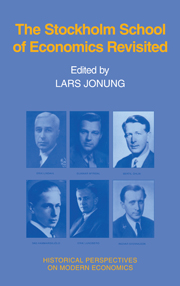Book contents
- Frontmatter
- Dedication
- Contents
- Preface
- List of Contributors
- Dramatis Personae at the end of 1937
- Introduction and Summary
- Part I The roots
- 1 The Political Economy Club and the Stockholm School, 1917–1951
- 2 Gösta Bagge, the Rockefeller Foundation, and empirical social science research in Sweden, 1924–1940
- Comment
- Comment
- 3 The Committee on Unemployment and the Stockholm School
- Part II The approach of the Stockholm School
- Part III The impact of the Stockholm School
- Part IV What remains of the Stockholm School?
- The Stockholm School: A non-Swedish bibliography
Comment
Published online by Cambridge University Press: 05 July 2013
- Frontmatter
- Dedication
- Contents
- Preface
- List of Contributors
- Dramatis Personae at the end of 1937
- Introduction and Summary
- Part I The roots
- 1 The Political Economy Club and the Stockholm School, 1917–1951
- 2 Gösta Bagge, the Rockefeller Foundation, and empirical social science research in Sweden, 1924–1940
- Comment
- Comment
- 3 The Committee on Unemployment and the Stockholm School
- Part II The approach of the Stockholm School
- Part III The impact of the Stockholm School
- Part IV What remains of the Stockholm School?
- The Stockholm School: A non-Swedish bibliography
Summary
I found it most interesting to hear the story of the Rockefeller money and Gösta Bagge's project told from the depth of the American archives. It would be possible to discuss a whole range of questions concerning the possible purposes and consequences of the project, which started in 1926 and soon developed into investigations on the cost of living, wages, and national income within a long-run perspective (1830/60–1930). I will touch on this range of questions very briefly.
Gösta Bagge not only obtained money but also inspiration from the United States. He was inspired by the institutionalists, and his main purpose at the outset was to study the impact of institutional factors – employers' associations, trade unions, collective contracts – on wages; the interest in these matters also grew with the permanently high levels of unemployment in the 1920s. In a broader sense Bagge's purpose was to conduct empirical research in order to make it possible to verify and develop economic theory.
At the beginning of the 1920s the institutionalists in the United States started investigating the growth of American national income and then moved on to wages. However, for Bagge's project in Sweden it was the other way around. It started with wages and continued with national income.
Erik Lindahl, who soon became the driving force behind the project, started the national income investigation in 1927. The possible objectives and implications of this work are, in my view, of considerable interest if one wishes to detect connections between Bagge's project and the development of economics in Sweden.
- Type
- Chapter
- Information
- The Stockholm School of Economics Revisited , pp. 97 - 100Publisher: Cambridge University PressPrint publication year: 1991



